In the realm of public safety, first responders are the unsung heroes who rush to the scene of emergencies, often putting their lives on the line to protect and assist others. These brave men and women face intense physical and emotional challenges daily, from rescuing individuals in life-threatening situations to witnessing traumatic events that most can only imagine. Yet, while they selflessly serve their communities, the mental health struggles of first responders are often overlooked. This article, “Navigating the Mental Health Struggles of First Responders,” sheds light on the silent battles they face and explores the unique challenges that can take a toll on their psychological well-being. We’ll delve into the importance of recognizing the signs of mental health issues, seeking help, and fostering a culture of support within this dedicated community. Join us on this journey to understand, empathize, and advocate for the mental health and resilience of our first responders.
Table of Contents
- The Silent Struggle Within
- The Unique Challenges They Face
- Recognizing the Signs of Mental Health Issues
- The Importance of Seeking Help
- Support Systems for First Responders
- Breaking the Stigma
- Training and Preparedness
- Coping Strategies for Resilience
- Stories of Hope and Recovery
- A Call to Prioritize Mental Health
- Frequently Asked Questions
The Silent Struggle Within
First responders are often seen as pillars of strength and resilience, rushing headfirst into emergencies to protect and save lives. However, behind the uniform and the heroic facade, a silent struggle brews within their hearts and minds. The first section of this article unveils the often-hidden mental health challenges faced by these dedicated individuals.
The Weight of the Badge
A study published in the “Journal of Occupational Health Psychology” reveals the significant psychological burdens carried by first responders. The demands of the job, exposure to traumatic events, and irregular work hours contribute to high levels of stress, anxiety, and depression among this population.
Stigma and Silence
Despite the mental toll they endure, first responders often hesitate to seek help due to the fear of stigma and potential repercussions on their careers. This reluctance to speak out exacerbates their internal battles.
The Price of Compassion
First responders display immense compassion and empathy in their line of work, but this very trait can lead to “compassion fatigue.” Research by Figley (2002) underscores how repeated exposure to suffering can erode their mental well-being.
Breaking Down the Silence
It is imperative to recognize that the first step towards healing is acknowledging the problem. By shedding light on the silent struggle within first responders, we pave the way for a culture of openness, understanding, and support.
The Unique Challenges They Face
First responders, including firefighters, paramedics, police officers, and emergency medical personnel, are the unsung heroes of society. While they play a vital role in ensuring public safety, they also face unique and significant challenges that can take a toll on their mental health and well-being.
The Burden of Trauma
First responders are frequently exposed to traumatic incidents, from car accidents to natural disasters and violent crimes. Witnessing and responding to these events can lead to acute stress reactions and long-term emotional trauma. A study by found that cumulative exposure to traumatic events significantly increased the risk of mental health issues, including depression and post-traumatic stress disorder (PTSD), among first responders.
Constant Vigilance
The nature of their work demands constant vigilance and readiness, which can lead to chronic stress. A study highlights the impact of chronic stress on first responders, showing a higher prevalence of sleep problems and physical health issues compared to the general population. The need to always be prepared for emergencies can erode their mental and emotional resilience over time.
Stigma and Reluctance to Seek Help
Despite the challenges they face, first responders often hesitate to seek help due to the stigma associated with mental health issues. They may fear that acknowledging their struggles will jeopardize their careers or standing among peers. This reluctance can lead to untreated mental health conditions and a higher risk of burnout.
Work-Life Imbalance
The irregular hours and demanding schedules of first responders can disrupt their work-life balance, making it challenging to maintain stable personal relationships and engage in self-care activities. This imbalance can contribute to stress and emotional strain.
The unique challenges faced by first responders are a critical concern for both the individuals in these professions and society as a whole. Recognizing these challenges is the first step toward providing the necessary support and resources to help these brave individuals navigate their mental health struggles effectively.
Recognizing the Signs of Mental Health Issues
First responders are often the first on the scene to provide aid and support during emergencies, but they are not immune to the mental health challenges that can arise from their line of work. It’s crucial to recognize the signs of mental health issues in first responders early on to provide them with the necessary support and resources.
Behavioral Changes
One of the early signs of mental health issues in first responders can be changes in behavior. They may become more withdrawn, irritable, or exhibit mood swings. These changes can be indicative of underlying stress or trauma.
Sleep Disturbances
Insomnia, nightmares, and other sleep disturbances are common among those grappling with mental health issues. First responders experiencing these problems may be struggling with distressing memories or emotions related to their work.
Increased Substance Use
Coping with stress and trauma can sometimes lead to increased alcohol or substance use. This can be a sign that a first responder is attempting to self-medicate to manage their emotional pain.
Emotional Distress
First responders may experience emotional distress in the form of excessive worry, anxiety, or a sense of hopelessness. They may express feeling overwhelmed by their work experiences.
Physical Symptoms
Mental health issues can manifest in physical symptoms such as headaches, digestive problems, and muscle tension. These physical symptoms may be a result of chronic stress.
Social Withdrawal
A noticeable withdrawal from social activities and relationships can indicate that a first responder is struggling with their mental health. They may isolate themselves due to shame, guilt, or a fear of burdening others.
Decline in Job Performance
A decline in job performance or increased absenteeism can be a clear sign of mental health issues among first responders. They may struggle to concentrate, make decisions, or carry out their duties effectively.
It’s important to note that recognizing these signs should be followed by offering support and encouraging professional help when needed. Early intervention can make a significant difference in the mental well-being of first responders and their ability to continue their vital work.
The Importance of Seeking Help
First responders face unique challenges in their line of duty that can take a toll on their mental health. Recognizing the importance of seeking help for mental health struggles is crucial not only for their well-being but also for the effective execution of their responsibilities.
Breaking the Stigma
First and foremost, seeking help breaks the stigma surrounding mental health within the first responder community. It sends a powerful message that it’s okay to struggle and that seeking assistance is a sign of strength, not weakness.
Preventing Escalation
Untreated mental health issues can worsen over time. By seeking help early, first responders can prevent their challenges from escalating into more severe conditions like post-traumatic stress disorder (PTSD) or depression.
Enhanced Coping Skills
Mental health professionals can equip first responders with coping strategies tailored to their unique experiences. These skills can help them manage stress, trauma, and emotional challenges more effectively.
Preservation of Careers
Seeking help can significantly extend a first responder’s career. By addressing mental health issues promptly, they can continue to serve their communities without being forced into early retirement due to debilitating conditions.
Improved Relationships
Mental health struggles can strain relationships with loved ones. Seeking help can lead to improved communication and stronger bonds with family and friends, as first responders learn to navigate their emotional challenges.
Safety and Performance
Ensuring that first responders are mentally fit is essential for their safety and the safety of those they serve. Seeking help can enhance their performance by reducing the risk of errors due to impaired mental health.
Supporting a Culture of Well-Being
When first responders seek help, they contribute to building a culture of well-being within their organizations. This encourages their colleagues to do the same and fosters a supportive environment.
First responders should be encouraged to seek help without fear of judgment or repercussions. By doing so, they not only protect their own mental health but also contribute to the resilience and effectiveness of their entire team.
Support Systems for First Responders
First responders routinely face high-stress situations that can have a profound impact on their mental well-being. To help them navigate these challenges, robust support systems are essential.
Peer Support Programs
Peer support programs are designed to encourage first responders to talk openly about their experiences with colleagues who have faced similar situations. These programs create a sense of camaraderie and provide a safe space for discussing mental health challenges. A study found that such programs are associated with decreased stigma and increased help-seeking behaviors among first responders.
Mental Health Services
Access to mental health professionals who understand the unique needs of first responders is critical. These services can include counseling, therapy, and psychiatric care. Research by Conway, Feder, and Mackenzie (2019) highlights the effectiveness of evidence-based mental health treatments in improving the mental well-being of first responders.
Employee Assistance Programs (EAPs)
Many first responder organizations offer EAPs, which provide confidential counseling and support services to employees and their families. These programs can be an essential resource for addressing various mental health concerns.
Training and Education
Providing mental health training and education to first responders can help them recognize the signs of mental health issues in themselves and their colleagues. This knowledge is invaluable in encouraging early intervention. A study underscores the importance of mental health training in reducing stigma and increasing help-seeking behaviors.
Resilience-Building Programs
Programs aimed at enhancing resilience and coping skills can help first responders better manage stress and trauma. Research suggests that resilience-building interventions can have a positive impact on the mental health of first responders.
Family Support
Involving families in the support system is essential. Families play a crucial role in understanding the unique challenges faced by first responders and can provide vital emotional support.
Community Engagement
Engaging with the local community can help first responders feel appreciated and valued. Acts of appreciation, such as public recognition or support from community organizations, can boost morale and strengthen their mental well-being.
Support systems tailored to the needs of first responders can significantly contribute to their mental health resilience and overall well-being. Encouraging a culture of open communication and assistance within the first responder community is key to ensuring these support systems are effective.
Breaking the Stigma
First responders are often viewed as pillars of strength in the community, but beneath the surface, they grapple with the same mental health challenges as anyone else. Breaking the stigma surrounding mental health within this profession is essential for the well-being of these dedicated individuals.
Challenging Stereotypes
First and foremost, it’s crucial to challenge stereotypes that equate vulnerability with weakness. Studies, show that exposure to mental health campaigns and education reduces stigma and encourages open discussions about mental well-being.
Encouraging Open Dialogue
Fostering an environment where first responders feel safe discussing their mental health concerns is paramount. Research highlights the importance of peer support in this context, as it can provide a judgment-free space for conversations about mental health challenges.
Promoting Access to Care
Promoting access to mental health care without fear of professional repercussions is essential. By ensuring confidentiality and offering resources for seeking help, first responders are more likely to reach out when they need it.
Leadership Engagement
Leadership within first responder organizations plays a crucial role in breaking the stigma. When leaders openly support mental health initiatives and seek mental health services themselves, it sends a powerful message that seeking help is a sign of strength.
Education and Training
Providing mental health education and training can empower first responders with the knowledge and skills to recognize and address their own mental health needs. Studies emphasize the effectiveness of such programs in reducing stigma.
Celebrating Resilience
Recognizing and celebrating the resilience of first responders can help shift the narrative around their mental health. Highlighting stories of recovery and resilience can inspire others to seek help and support their colleagues in doing so.
Raising Awareness
Public awareness campaigns that humanize first responders and share their mental health journeys can be instrumental in breaking the stigma. These campaigns emphasize that mental health challenges can affect anyone, regardless of their profession.
Breaking the stigma surrounding mental health among first responders is a collective effort that requires a cultural shift within organizations and communities. By prioritizing mental well-being, supporting open dialogue, and providing access to resources, we can ensure that first responders receive the care and support they need.
Training and Preparedness
In the demanding world of first responders, where every day brings forth unpredictable challenges and high-stress situations, the importance of mental health cannot be overstated. These brave individuals are often the first on the scene of emergencies, dealing with life and death situations, and witnessing traumatic events that most people can’t fathom. To navigate the mental health struggles that often accompany this line of work, first responders must be equipped with the necessary training and preparedness. This article explores the crucial role of training and preparedness in supporting the mental resilience of our dedicated first responders.
The Power of Preparedness
Preparedness starts with proactive training programs designed to equip first responders with the skills and knowledge they need to effectively manage high-pressure situations. Comprehensive training not only enhances their ability to handle emergencies but also fosters mental resilience. A study found that first responders who participated in resilience training programs reported significantly lower levels of stress and better coping strategies, highlighting the positive impact of preparedness initiatives on mental well-being.
Simulations and Realistic Drills
One of the cornerstones of first responder training is the use of simulations and realistic drills. These exercises expose them to scenarios that mimic real-life emergencies, allowing them to practice their response skills in a controlled environment. According to a study participating in high-fidelity simulations not only improves technical proficiency but also boosts confidence and mental preparedness among first responders, making them better equipped to handle the challenges they face.
Effective training and preparedness programs are invaluable tools in safeguarding the mental health of first responders. By providing them with the skills, knowledge, and mental resilience needed to navigate the unique challenges they encounter daily, we can better support these heroes in maintaining their well-being while they continue to protect and serve our communities.
Coping Strategies for Resilience
The demanding and often traumatic nature of first responders’ work exposes them to unique mental health challenges. In this essay, we will delve into the essential coping strategies that can bolster the resilience of these brave individuals, allowing them to navigate the turbulent waters of their profession more effectively.
Understanding the Mental Toll
First responders are frequently confronted with situations that can leave a lasting impact on their mental well-being. To address these challenges effectively, it is crucial to understand the toll they can take. One study found that repeated exposure to traumatic incidents, such as attempted suicides, can significantly affect the mental health of paramedics. Recognizing the gravity of these experiences is the first step towards developing effective coping mechanisms.
Seeking Professional Support
One of the most vital coping strategies is seeking professional support. First responders should be encouraged to reach out to mental health professionals who are well-versed in the unique challenges of their profession. The study highlights the importance of simulation training for emergency medical services providers, which can serve as a bridge between the field experiences and professional help. Simulations allow responders to process traumatic events in a controlled environment, fostering better mental health outcomes.
Peer Support Networks
Peer support networks play a pivotal role in promoting resilience among first responders. Connecting with colleagues who share similar experiences can provide a sense of camaraderie and understanding that is hard to find elsewhere. Encouraging open conversations and the sharing of experiences within these networks can be immensely therapeutic.
Stress Management Techniques
Teaching stress management techniques is another crucial aspect of coping. Breathing exercises, mindfulness practices, and physical activities like yoga can help first responders manage the intense stress that comes with their job. These techniques enable them to stay grounded and maintain their mental well-being in the face of adversity.
Balancing Work and Life
Maintaining a healthy work-life balance is essential for resilience. First responders should be encouraged to take breaks, spend quality time with loved ones, and engage in hobbies outside of work. This balance can act as a protective shield against burnout and mental health issues.
‘First responders’ mental health struggles are a pressing concern, and coping strategies are essential for their resilience. By understanding the mental toll, seeking professional support, fostering peer networks, practicing stress management techniques, and maintaining a work-life balance, these heroes can navigate their challenging profession while preserving their mental well-being.
Stories of Hope and Recovery
First responders often face intense and traumatic situations that can take a toll on their mental health. However, it’s crucial to highlight the stories of hope and recovery that exemplify the resilience within this community. These stories are a testament to the strength of first responders and their ability to overcome the challenges they encounter.
In a study, it was found that first responders shared their narratives of resilience. This study revealed that many first responders developed coping strategies, sought support, and found renewed purpose in their work after experiencing traumatic events. Their stories serve as inspiring examples of how individuals within this profession can navigate mental health struggles and emerge stronger.
The Role of Peer Support
Peer support plays a pivotal role in the mental health recovery of first responders. Sharing experiences and learning from peers who have faced similar challenges can be incredibly empowering. Many organizations have recognized the significance of peer support programs and have integrated them into their mental health initiatives.
A study found that the effectiveness of peer support programs was evaluated. The findings revealed that first responders who engaged in peer support reported decreased symptoms of anxiety and depression and improved overall mental well-being. These positive outcomes underscore the importance of fostering a sense of community and understanding among first responders.
Hope for the Future
While the mental health struggles of first responders are significant, stories of hope and recovery serve as a beacon of optimism. By sharing these stories, we not only acknowledge the challenges but also celebrate the strength and resilience within the first responder community. It’s a reminder that, with the right support and resources, recovery and renewal are possible.
The stories of hope and recovery among first responders demonstrate the unwavering resilience within this community. They inspire us to continue supporting their mental health and well-being, ensuring that every first responder has the opportunity to find hope and healing on their journey.
A Call to Prioritize Mental Health
First responders, including firefighters, police officers, and paramedics, are the backbone of our communities. They rush to our aid during emergencies, often putting their lives on the line to ensure our safety. However, the heroic efforts of these individuals can come at a steep cost to their mental health. The mental health struggles of first responders have reached crisis proportions, demanding urgent attention and action.
Study Highlights the Urgency
A study sheds light on the gravity of the situation. The study surveyed thousands of first responders across the country and found alarmingly high rates of stress, anxiety, depression, and post-traumatic stress disorder (PTSD). These mental health challenges not only affect the well-being of first responders but also impact their ability to perform their duties effectively.
The Imperative for Change
The findings of studies like that of Andrews et al. underscore the urgent need for change. We must prioritize the mental health of our first responders. To address this crisis, we must take concrete steps to provide accessible mental health support, reduce the stigma associated with seeking help, and implement comprehensive mental health programs within first responder organizations.
Breaking the Stigma
One significant barrier to seeking mental health support among first responders is the persistent stigma surrounding mental health issues. However, studies have shown that targeted interventions can effectively break down this stigma. A study explored various strategies to reduce stigma. The study found that education, training, and open conversations within the first responder community were effective in changing attitudes and encouraging help-seeking behavior.
The Way Forward
The mental health struggles of first responders cannot be ignored any longer. The evidence from studies like those conducted by Andrews et al. and Baker et al. leaves no doubt about the urgent need for action. As a society, we must commit to prioritizing the mental health of those who selflessly protect and serve us. It’s time to break the stigma, provide accessible support, and ensure that first responders receive the mental health care they deserve.
Frequently Asked Questions
First responders often grapple with mental health challenges like post-traumatic stress disorder (PTSD), depression, anxiety, and substance abuse due to the high-stress and traumatic nature of their duties. Witnessing traumatic events, the pressure of making life-or-death decisions, and long working hours can contribute to these struggles.
Recognizing signs such as changes in behavior, mood swings, withdrawal from social interactions, or increased substance use is crucial. Early recognition allows for timely intervention and support, which can prevent more severe mental health crises and promote overall well-being.
First responders have access to specialized mental health programs, employee assistance programs (EAPs), peer support networks, and crisis hotlines. Many organizations are also working to reduce the stigma around seeking help for mental health issues, encouraging open discussions and access to professional counseling.
Proactive mental health management involves regular self-assessment, self-care practices, and stress reduction techniques like mindfulness or physical exercise. Building a strong support network of colleagues who understand the unique challenges of the job and seeking professional help when needed are essential steps in maintaining mental health and resilience in the demanding field of first response.









